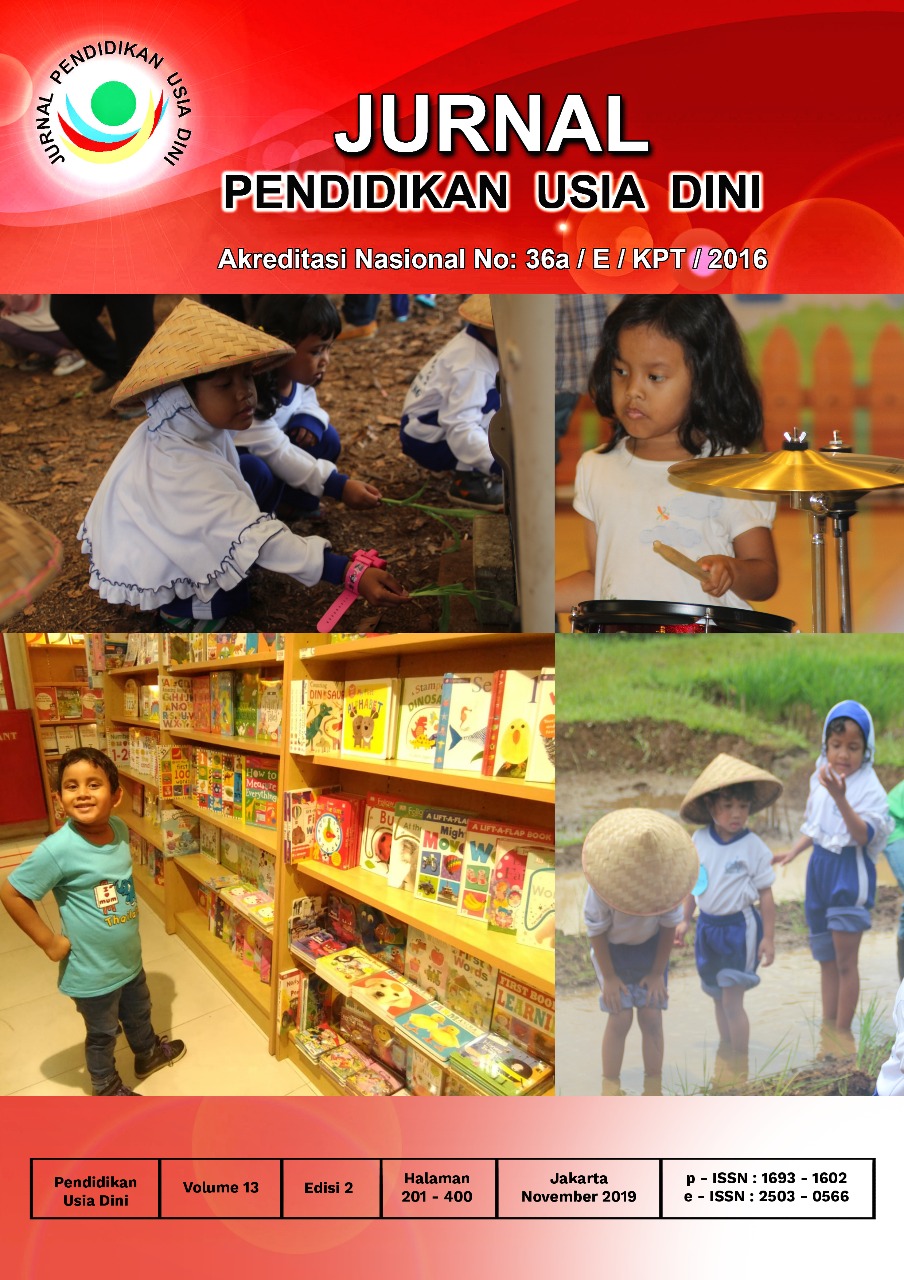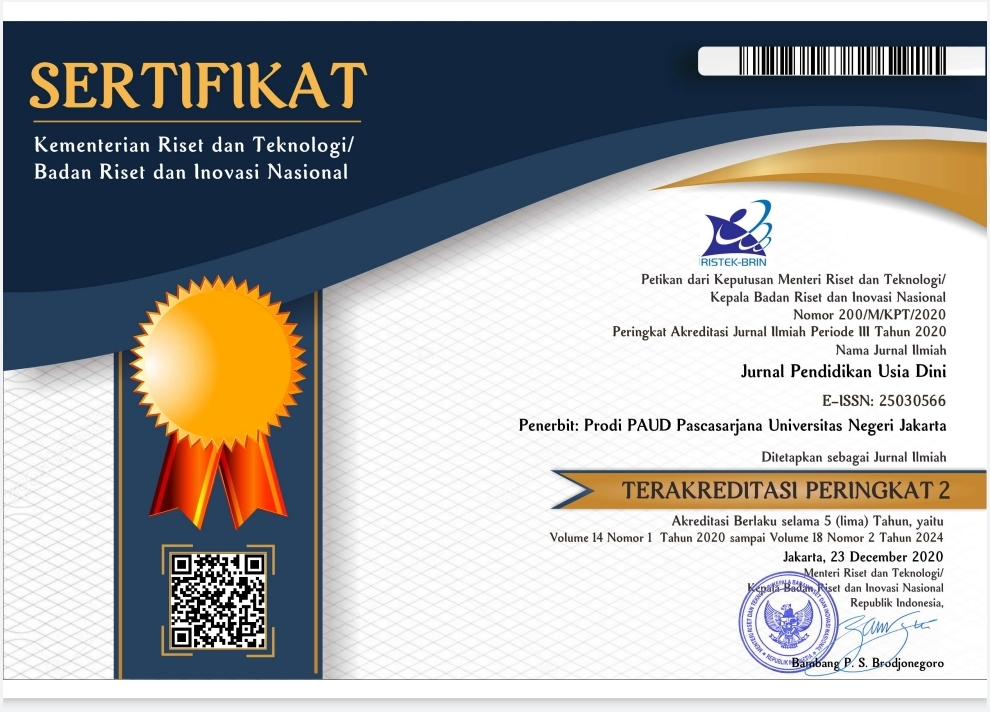Transformation of Tolerance Values (in Religion) in Early Childhood Education
DOI:
https://doi.org/10.21009/JPUD.132.13Abstract
Religious tolerance is a supporter of social harmony and brings a country to a better life. Instilling tolerance in early childhood is a challenge for early childhood educators. This study aims to describe the transformation of religious tolerance values by teachers in early childhood education. This research is a type of qualitative case study research model with researchers as observer participants. This research produces the following findings, that (1) transformation of tolerance values among religious communities, is explicitly not taught in Early Childhood Education (ECE) on the grounds that all students are of the same religion, (2) transformation of tolerance of values among religious students taught through learning integrated with other lessons, (3) although explicitly the values of tolerance among religious students are not taught, but the values of togetherness such as greeting, sharing something that is owned, and helping the needs of other students are taught by practicing at the same time.
Keywords: Early Childhood Education, Tolerance Values in Religion
References:
Adams, K. (2019). Navigating the spaces of children’s spiritual experiences: influences of tradition(s), multidisciplinarity and perceptions. International Journal of Children’s Spirituality, 24(1), 29–43. https://doi.org/10.1080/1364436X.2019.1619531
Adams, K., Bull, R., & Maynes, M. L. (2016). Early childhood spirituality in education: Towards an understanding of the distinctive features of young children’s spirituality. European Early Childhood Education Research Journal, 24(5), 760–774. https://doi.org/10.1080/1350293X.2014.996425
Atamturk, N. (2018). The role of English as a foreign language classes in tolerance education in relation to school management practices. Quality and Quantity, 52, 1167–1177. https://doi.org/10.1007/s11135-017-0575-7
Banerjee, K., & Bloom, P. (2015). “Everything Happens for a Reason”: Children’s Beliefs About Purpose in Life Events. Child Development, 86(2), 503–518. https://doi.org/10.1111/cdev.12312
Bano, M., & Ferra, E. (2018). Family versus school effect on individual religiosity: Evidence from Pakistan. International Journal of Educational Development, 59(August 2017), 35–42. https://doi.org/10.1016/j.ijedudev.2017.10.015
Coleman, E. B., & Eds, K. W. (2011). Religious Tolerance, Education and the Curriculum. In Religious Tolerance, Education and the Curriculum. https://doi.org/10.1007/978-94-6091-412-6
Elza, Y., Handini, M. C., & Abdurrahman, M. (2018). The Effects of Storytelling Method with Audiovisual Media and Religiosity toward Clean and Healthy Living Program Behaviour ( CHLB ) of Early Childhood. International Journal of Multidisciplinary and Current Research, 6(June), 547–552.
Ene, I., & Barna, I. (2015). Religious Education and Teachers’ Role in Students’ Formation towards Social Integration. Procedia - Social and Behavioral Sciences, 180(November 2014), 30–35. https://doi.org/10.1016/j.sbspro.2015.02.081
Ergun, S. J., & Rivas, M. F. (2019). The effect of social roles, religiosity, and values on climate change concern: An empirical analysis for Turkey. Sustainable Development, 27(4), 758–769. https://doi.org/10.1002/sd.1939
Faas, D., Smith, A., & Darmody, M. (2018). Children’s Agency in Multi-Belief Settings: The Case of Community National Schools in Ireland. Journal of Research in Childhood Education, 32(4), 486–500. https://doi.org/10.1080/02568543.2018.1494645
Firdaus, E. (2018). The Learning of Religious Tolerance among Students in Indonesia from the Perspective of Critical Study. IOP Conference Series: Earth and Environmental Science, 145(1). https://doi.org/10.1088/1755-1315/145/1/012032
Ganjvar, M. (2019). Islamic Model of Children’s Spiritual Education (CSE); its influence on improvement of communicational behaviour with non-coreligionists. International Journal of Children’s Spirituality, 24(2), 124–139. https://doi.org/10.1080/1364436X.2019.1624254
Granqvist, P., & Nkara, F. (2017). Nature meets nurture in religious and spiritual development. British Journal of Developmental Psychology, 35(1), 142–155. https://doi.org/10.1111/bjdp.12170
Heiphetz, L., Lane, J. D., Waytz, A., & Young, L. L. (2016). How Children and Adults Represent God’s Mind. Cognitive Science, 40(1), 121–144. https://doi.org/10.1111/cogs.12232
King, U. (2013). The spiritual potential of childhood: Awakening to the fullness of life. International Journal of Children’s Spirituality, 18(1), 4–17. https://doi.org/10.1080/1364436X.2013.776266
Kirschenbaum, H. (2019). Models of Values Education and Moral Education in the Era of the Fourth Industrial Revolution. 8(2), 103–109.
Lehtonen, M. (2019). The Development of Religious Tolerance: Co-operative Board Games with Children and Adolescents. IATL Reinvention: An International Journal of Undergraduate Research, 2(2). Retrieved from https://warwick.ac.uk/fac/cross_fac/iatl/reinvention/
Łowicki, P., & Zajenkowski, M. (2019). Empathy and Exposure to Credible Religious Acts during Childhood Independently Predict Religiosity. International Journal for the Psychology of Religion, 00(00), 1–14. https://doi.org/10.1080/10508619.2019.1672486
Maussen, M., Bader, V., Dobbernack, J., Modood, T., Olsen, T. V., Fox, J., & Vidra, Z. (2012). Tolerance and cultural diversity in schools Comparative report. Amsterdam.
Miedema, S., & Bertram-Troost, G. (2008). Democratic citizenship and religious education: Challenges and perspectives for schools in the Netherlands. British Journal of Religious Education, 30(2), 123–132. https://doi.org/10.1080/01416200701830970
Moore, D. . (2007). Overcoming Religious Illiteracy: A Cultural Studies Approach to the Study of Religion in Secondary Education. US: Palgrave Macmillan.
Niculescu, R. M., & Norel, M. (2013). Religious Education an Important Dimension of Human’s Education. Procedia - Social and Behavioral Sciences, 93, 338–342. https://doi.org/10.1016/j.sbspro.2013.09.200
Pandya, S. P. (2019). Spiritual education programme (SEP) for enhancing the quality of life of kindergarten school children. Pastoral Care in Education, 37(1), 59–72. https://doi.org/10.1080/02643944.2018.1562493
Parekh, B. (2019). Ethnocentric Political Theory. Ethnocentric Political Theory, 263–284. https://doi.org/10.1007/978-3-030-11708-5
Sari, A. D. P., & Indartono, S. (2019). Teaching Religious Tolerance Through Social Studies Education Based On Multicultural Approach. 323(ICoSSCE 2018), 214–219. https://doi.org/10.2991/icossce-icsmc-18.2019.40
Scheiner, P. (2015). Crossings and Crosses: Borders, Educations, and Religions in Northern Europe. Boston/Berlin: Walter de Gruyter Inc.
Scott, K. (2014). Inviting young adults to come out religiously, institutionally and traditionally. Religious Education, 109(4), 471–484. https://doi.org/10.1080/00344087.2014.924790
Stockinger, H. (2019). Developing spirituality–an equal right of every child? International Journal of Children’s Spirituality, 24(3), 307–319. https://doi.org/10.1080/1364436X.2019.1646218
Thibodeau, R. B., Brown, M. M., Nancarrow, A. F., Elpers, K. E., & Gilpin, A. T. (2018). Conceptual Similarities among Fantasy and Religious Orientations: A Developmental Perspective. Journal of Cognition and Culture, 18(1–2), 31–46. https://doi.org/10.1163/15685373-12340021
Tratner, A. E., Sela, Y., Lopes, G. S., Ehrke, A. D., Weekes-Shackelford, V. A., & Shackelford, T. K. (2017). Individual differences in childhood religious experiences with peers. Personality and Individual Differences, 119, 73–77. https://doi.org/10.1016/j.paid.2017.06.045
UNESCO. (2015). Second UNESCO Forum on Global Citizenship Education: Building Peaceful and Sustainable Societies (Paris, 28-30 January 2015). Final Report. (January), 1–22. Retrieved from http://www.unesco.org/new/fileadmin/MULTIMEDIA/HQ/ED/pdf/FinalReport-GCED_21April.pdf
Uzefovsky, F., Döring, A. K., & Knafo-Noam, A. (2016). Values in Middle Childhood: Social and Genetic Contributions. Social Development, 25(3), 482–502. https://doi.org/10.1111/sode.12155
Van Der Walt, J. L. (2014). Towards an instrument for measuring religious tolerance among educators and their students worldwide (Potchefstroom Campus-North-West University). Retrieved from https://www.driestar-educatief.nl/medialibrary/Driestar/Engelse-website/Documenten/2014-VanderWalt-Measuring-religious-tolerance-in-education.pdf
Yulianti, E., Sutarto, J., & Sugiyo. (2019). Sentra Nasima Learning Strategies to Enhance Religious Nationalist Characters in Kindergarten. Journal of Primary Education, 8(69), 238–247.
Downloads
Published
How to Cite
Issue
Section
License
JURNAL PENDIDIKAN USIA DINI work is licensed under a Creative Commons Attribution 4.0 International License. (http://creativecommons.org/licenses/by/4.0/)





